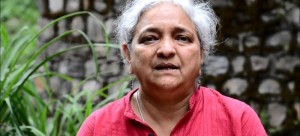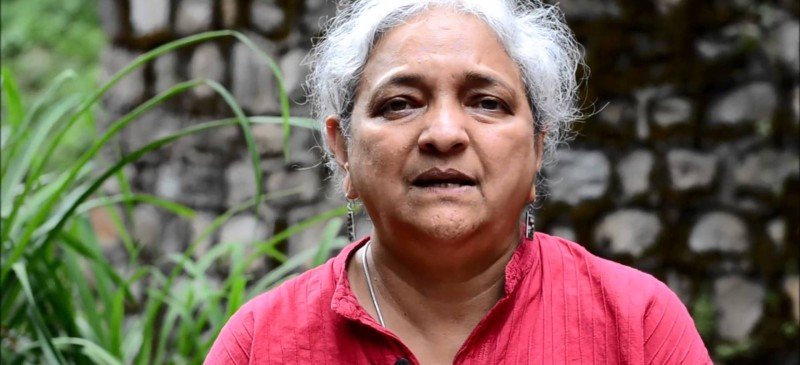by Lionel Bopage
 |
| Image courtesy One Billion Rising / Beyond Borders |
Last Thursday, I was reading an article about Joan Jara, the widow of renowned Chilean activist, singer, songwriter and theatre director Victor Jara, and her family. They are seeking long-delayed justice for the kidnap, torture and brutal murder of Victor in 1973, by the Chilean secret police. My memories immediately went back to November 1977, when all political prisoners including me were released in Sri Lanka. A couple of months later, comrade Sunila Abeysekera and I were discussing at her parents’ house in Nawala, the inspiration Victor Jara brought to those who were working for social change for a better world. This morning, Chitra and I were greatly saddened by the news that comrade Sunila, one of the best, exceptional and inspiring human rights activists of our time had passed away in Sri Lanka.
I first met Sunila in late 1977 at a bookshop in Colombo, to mainly discuss the formation of a grass roots based human rights organisation. My first impression of her is indelibly etched in my mind. I saw an attractive young woman of about 25 years of age, vehemently striking a manual typewriter trying to finish off an article she was writing. I remember her apologetically asking me to wait a little while. That was our first encounter.
Later on, I came to know that she had deep roots in theatre and music. In the 60s and 70s, she had taken the Sinhala theatre by storm with her haunting voice and breathtaking performances. She had been conducting notable performances on stage in her early twenties, in Indian classical and Kandyan dance. In the seventies, she had commenced lending her voice to film music and had also become a familiar figure at concerts. Even to date, the beautiful melodies ‘Udumbara Hinahenawa’ (Udumbara smiling) in ‘Bambaru Avith’ (Wasps are Here) and ‘Hemin Sare Piya Sala’ (Flying Slowly) in ‘Hansa Vilak’ (A Swan Lake) continues to resonate and be in demand in Sri Lanka.
How did such a vibrant artistic career in film and music give way to human rights activism? Human rights had emerged as a major issue in the 1970s, as successive governments in Sri Lanka responded to youth militancy in the south and north with repressive legislation, arbitrary arrest and detention, torture and curbs on the freedom of expression, including censorship. She had been active in civil society groups since the late 1970s, untiringly working for the release of political prisoners and advocating a negotiated political solution to the national question.
The 1971 youth insurrection had left an indelible mark on Sunila’s conscience. In her early 20s, Sunila with other young colleagues had started visiting young detainees held in Sri Lankan prisons. Taking them food and clothing, letters from family, she gradually became involved with their legal defence. It was at this time that she left the stage and began her life of activism.
When we finally organised the ‘Human Rights Organisation’ (HRO), its President was Regi Siriwardena, a former LSSP veteran, with Sunila as the Secretary. The HRO opened branches in rural areas, and the JVP was also looking for recruits for the HRO among the clergy and the intellectuals. Sunila had known Chitra before I came to know her. It was while working in these projects that Sunila became the intermediary of my relationship with Chitra leading to our life partnership.
I recollect grabbing Sunila from a film studio in Narahenpita, where she was recording the theme song of the film ‘Bambaru Avith’, to record ‘Vimukthi Gee’ songs at Ogee Studio in Bambalapitiya. On another occasion, I attended her singing, when she contributed to the popular drama ‘Angara Ganga Gala Basee’ (River Angara Flows Down). However, her appearance on the ‘Vimukthi Gee‘ stage in the late seventies and early eighties was very different from her previous role as an artiste. Now she was singing for the ordinary folk in villages and towns where she with other singers and musicians, sang songs of struggle, protest and liberation. She was the best female vocalist in the troupe.
At the time, she was also working as a writer and translator for the journal ‘Red Power,’ which I was editing. She also did political work on behalf of the party in the lower middle and upper-class niches in Colombo. This was the time, when the second wave of feminism had reached a high water mark in Western countries. The JVP manifesto supported the rights of women in terms of a fair wage and appropriate working conditions. The idea of the personal being political, a woman being an independent sexual being, that the home was just as exploitative as the workplace and that patriarchy, not capitalism, was the primary cause of the oppression of women had not touched the political consciousness of a JVP cadre.
Therefore, Sunila’s journey had several major hiccups. Being brought up in the better part of Colombo and having received a western tertiary education, her work and cultural ethic was so different to the rural Sinhala, Buddhist, semi-proletarian and lower middle-class background of the average JVP cadre. They were extremely conservative and patriarchal in their thinking on cultural issues. Sunila was passionate, bohemian and demonstrative; we of the JVP were the complete opposite. Ultimately, the relationship between her and the party came to an abrupt end. Later, in the eighties, I met Sunila a couple of times, but the intensity of our friendship has not been the same. Yet we continued to keep in touch.
In my mind, this did not and should not diminish the role she played in defending human rights including the rights of women and non-majoritarian communities in Sri Lanka. She was a powerful figure not only in the Sri Lanka women’s movement of Sri Lanka, but also of the international movement. She played a major role in the collective effort to draw the UN’s attention to the need to include women’s concerns, voices, and perspectives in peace building and conflict-transformation. Her work extended to the situation of civilians in war-affected areas, the rights of communities such as sex workers, people living with HIV/AIDS, and lesbian, gay, and transgender persons, and sexual and reproductive rights of women.
During the periods of armed conflict in Sri Lanka, Sunila denounced human rights violations committed by all parties to conflicts. She was one of the first Sri Lankans to raise the issue of disappearances in the nineties, when hundreds of young people, particularly in the South were disappearing at the hands of the State and the JVP. She addressed the United Nations Human Rights Council at its opening session in 2006. Being critical of the government, she shrugged off the risks that posed to her own safety. She was branded a traitor and an enemy of the state. A woman from the Sinhala majority defending the rights of Tamils, they could not stand. However, she never wavered. Hers was an uncompromising struggle against the entrenched culture of impunity of withholding accountability of those who had been responsible for enforced disappearances and killings of civilians.
She began highlighting rights violations in Sri Lanka, perpetrated under the guise of the Prevention of Terrorism Act and later through the promulgation of Emergency rule and the various Emergency regulations. Her work also included protection of the displaced due to armed conflict. At peak periods of repression, she arranged to document disappearances, and frequently took this information to the UN and other international agencies. Because of her fearless and tireless advocacy and commitment to human rights and social justice, she faced death threats and had to leave the country, as her life was in danger in the nineties and in recent times. In recognition of her human rights activism, she was awarded the 1998 UN Human Rights Award for Asia and the Pacific.
The last time we sang together as a group was in the year 2008, in Colombo in commemoration of those who laid down their lives during the April 1971 insurrection in Sri Lanka. In 2010, Chitra and I had the occasion to visit Sunila in Malaysia, when she was undergoing treatment for cancer. She was as determined as ever to carry on with her struggle for human rights and social justice.
Sunila was an enormously courageous and inspiring friend, a caring mother, a tireless and committed activist, a professional artiste, writer and critic, and an ardent feminist. She struggled for four decades seeking justice for victims of human rights abuses in Sri Lanka. We, including all those who suffered and continue to suffer human rights violations are going to miss her deeply. The only way to fill the vacuum she has left and her legacy is to further strengthen our role in the protection of human rights and unswervingly commit to the cause of social justice.
We extend our sincere and most heartfelt sympathies to her family and friends. Her friendship, commitment to social justice and activism on behalf of the dispossessed will be solely missed by us all.
###
The author was jailed twice and tortured for his roll as a former leader of a mass liberation movement in Sri Lanka in the 1970s and 1980s, called the Janatha Vimukthi Peramuna (People’s Liberation Front). He rose to the position of general secretary of the JVP but resigned from the group in 1984 over a number of differences, including his principled support for the right of national self-determination for the Tamil people. He was eventually forced into political exile together with his wife, Chitra. They now live in Melbourne, Australia, where they continue to be outspoken defenders of human rights and social justice. (Courtesy Green Left Weekly) / GV
